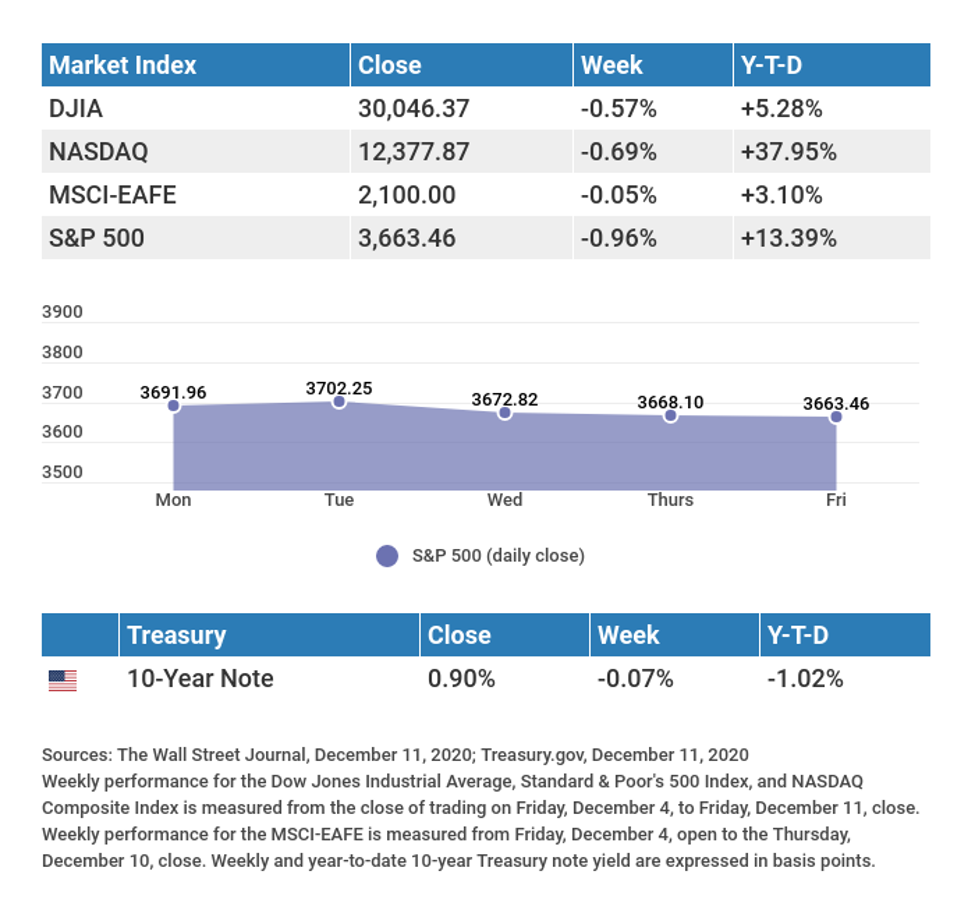Cases Rise, Stocks Retreat
The Week on Wall Street
Stocks retreated last week on rising COVID-19 infections and slow progress on an economic relief bill.
The Dow Jones Industrial Average dipped 0.57%, while the Standard & Poor’s 500 dropped 0.96%. The Nasdaq Composite index fell 0.69% for the week. The MSCI EAFE index, which tracks developed overseas stock markets, declined 0.05%.[1][2][3]
Stimulus Stalls, Stocks Stumble
The market grappled all week with worries over rising COVID-19 cases and the economic restrictions that followed. Nevertheless, there were moments of optimism— such as the starting of vaccinations in the U.K.— that drove markets to record highs.[4]
But gains could not be sustained as an agreement on a fiscal stimulus bill remained elusive and daily news regarding COVID-19 cases undermined investor sentiment.
Markets were also challenged by having to absorb a number of new and secondary stock offerings last week, including two high-profile technology IPOs. The Energy sector continued its strong run, while small and mid-cap stocks posted another week of positive performance.[5]
A “No-Deal” Brexit More Likely
The prospects of an agreement to manage Britain’s exit from the European Union by year end dimmed as the two parties failed to narrow their differences in a meeting held last week.[6]
Though primarily a European issue, a no-deal Brexit may hold consequences for U.S. businesses and investors. The failure to reach an agreement has the potential to disrupt an already fragile supply chain and cause issues in the financial markets. A supply chain disruption may weaken European economies (e.g., Germany) that are important to American companies. Another consequence may be a stronger U.S. dollar, which would make American exports more expensive and less competitive.
Little time remains in striking an agreement since the prevailing framework ends December 31, 2020.
THIS WEEK: KEY ECONOMIC DATA
Tuesday: Industrial Production.
Wednesday: Retail Sales, Federal Open Market Committee (FOMC) Announcement.
Thursday: Housing Starts, Jobless Claims.
Friday: Index of Leading Economic Indicators.
Source: Econoday, December 11, 2020
The Econoday economic calendar lists upcoming U.S. economic data releases (including key economic indicators), Federal Reserve policy meetings, and speaking engagements of Federal Reserve officials. The content is developed from sources believed to be providing accurate information. The forecasts or forward-looking statements are based on assumptions and may not materialize. The forecasts also are subject to revision.
THIS WEEK: COMPANIES REPORTING EARNINGS
Thursday: General Mills (GIS)
Friday: Darden Restaurants (DRI)
Source: Zacks, December 11, 2020
Companies mentioned are for informational purposes only. It should not be considered a solicitation for the purchase or sale of the securities. Investing involves risks, and investment decisions should be based on your own goals, time horizon, and tolerance for risk. The return and principal value of investments will fluctuate as market conditions change. When sold, investments may be worth more or less than their original cost. Companies may reschedule when they report earnings without notice.
Investing involves risk including the potential loss of principal. No investment strategy can guarantee a profit or protect against loss in periods of declining values.
Diversification does not guarantee profit nor is it guaranteed to protect assets.
International investing involves special risks such as currency fluctuation and political instability and may not be suitable for all investors.
The Standard & Poor's 500 (S&P 500) is an unmanaged group of securities considered to be representative of the stock market in general.
The Dow Jones Industrial Average is a price-weighted average of 30 significant stocks traded on the New York Stock Exchange and the Nasdaq. The DJIA was invented by Charles Dow back in 1896.
The Nasdaq Composite is an index of the common stocks and similar securities listed on the Nasdaq stock market and is considered a broad indicator of the performance of stocks of technology companies and growth companies.
The MSCI EAFE Index was created by Morgan Stanley Capital International (MSCI) that serves as a benchmark of the performance in major international equity markets as represented by 21 major MSCI indices from Europe, Australia, and Southeast Asia.
The 10-year Treasury Note represents debt owed by the United States Treasury to the public. Since the U.S. Government is seen as a risk-free borrower, investors use the 10-year Treasury Note as a benchmark for the long-term bond market.
Opinions expressed are subject to change without notice and are not intended as investment advice or to predict future performance.
Past performance does not guarantee future results.
You cannot invest directly in an index.
Consult your financial professional before making any investment decision.
Fixed income investments are subject to various risks including changes in interest rates, credit quality, inflation risk, market valuations, prepayments, corporate events, tax ramifications and other factors.
These are the views of Platinum Advisor Strategies, LLC, and not necessarily those of the named representative, Broker dealer or Investment Advisor and should not be construed as investment advice. Neither the named representative nor the named Broker dealer or Investment Advisor gives tax or legal advice. All information is believed to be from reliable sources; however, we make no representation as to its completeness or accuracy. Please consult your financial professional for further information.
The market indexes discussed are unmanaged and generally considered representative of their respective markets. Individuals cannot directly invest in unmanaged indexes. Past performance does not guarantee future results. The return and principal value of investments will fluctuate as market conditions change. When sold, investments may be worth more or less than their original cost.
- The Wall Street Journal, December 11, 2020
- The Wall Street Journal, December 11, 2020
- The Wall Street Journal, December 11, 2020
- USAToday.com, December 8, 2020
- CNBC.com, December 10, 2020
- CNBC.com, December 9, 2020


